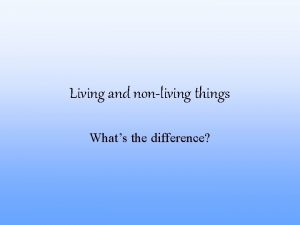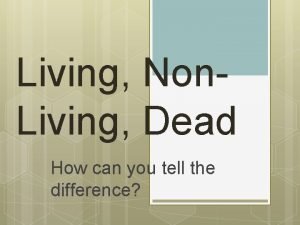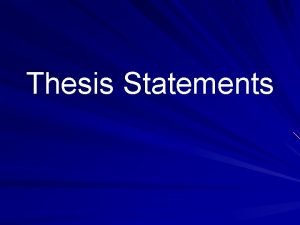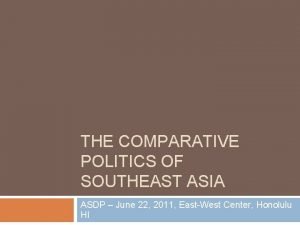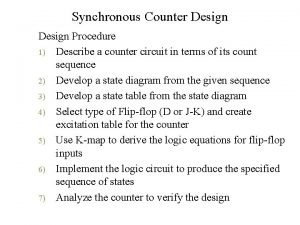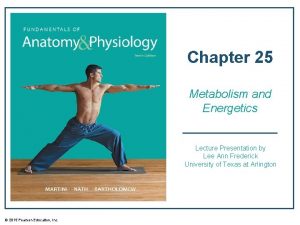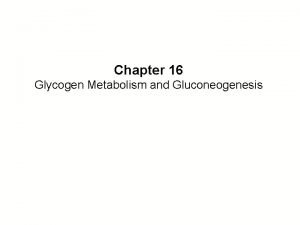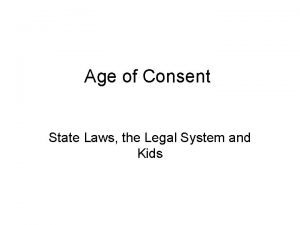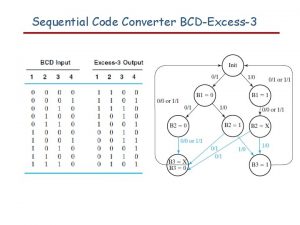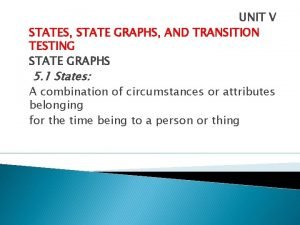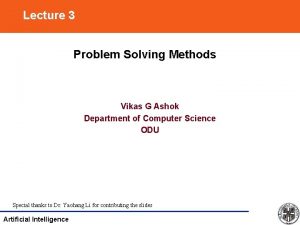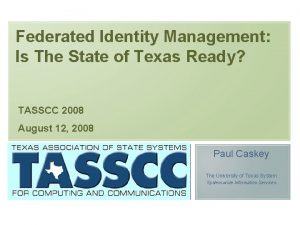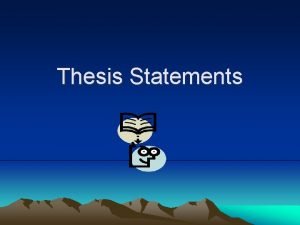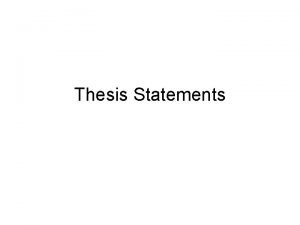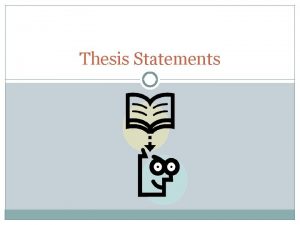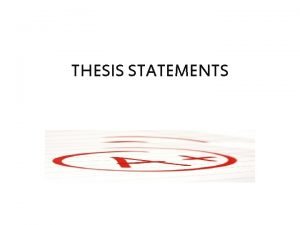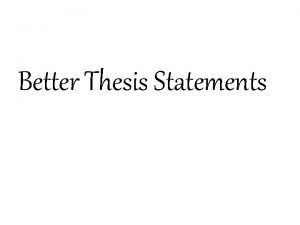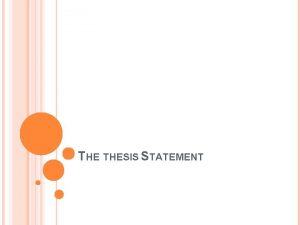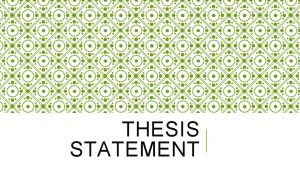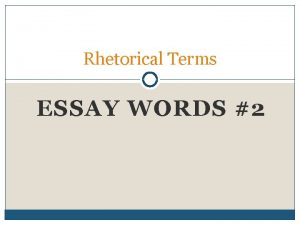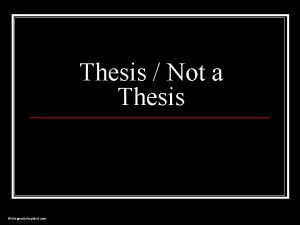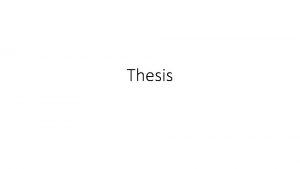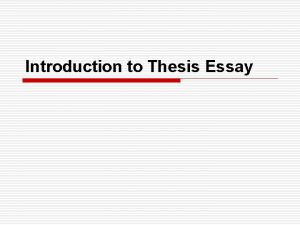Crisis Thesis Living in a state of crisis
























- Slides: 24

Crisis

Thesis: Living in a state of crisis • The 21 st century brought about a set of crises (security, social, economic, political etc. ) • Crisis can be seen as the single most significant marker of our times: we live in a state of crisis • It affects all aspects of social and cultural life • Understanding the meaning, dynamics and effects of crisis is crucial to a critical understanding of (almost) any contemporary cultural phenomena

The concept of crisis • “ the idea of ‘crisis’ tends to drift nowadays back to its medical origins. It was coined to denote the moment in which the future of the patient was in the balance, and the doctor had to decide which way to go and what treatment to apply to help the ill into convalescence. Speaking of crisis of whatever nature, including the economic, we convey firstly the feeling of uncertainty, of our ignorance of the direction in which the affairs are about to turn – and secondly the urge to intervene: to select the right measures and decide to apply them promptly. … And let me add that there is an endemic contradiction involved: after all, the … state of uncertainty/ignorance doesn’t bode well for the chance of selecting ‘right measures‘ and so prompting things to go in the desired direction. ” (Bauman 7) • Thus: the critical time is the decisive time when we must find new solutions quickly, but we cannot see clearly

Premature conclusions

Outline of the lecture • 1. Introduction • 2. The history of the recent crisis • 3. The various aspects of the crisis • 4. Effects of the crisis

1. Introduction: The State of Crisis • 2016: „The worst year ever. ” • Short list: the death of David Bowie, Prince, Leonard Cohen, the Brexit vote, Trump’s election, a series of terrorist attacks throughout Europe, the Syrian war (Aleppo’s siege), the Zyka outbreak, record number of police shootings in the US • The sense that we are living in a state of crisis is prevalent in European and North-American societies • There is a culture of crisis evolving

1. Introduction: The State of Crisis

1. Introduction: The State of Crisis • “the crisis facing the Western world is not temporary, but the sign of a profound change that involves the whole economic and social system and will have long-lasting effects” (Bauman and Bordoni, vii) • “Financial crisis, environmental crisis: what is the combination of credit crunch and global warming telling us about the way we live? I would contend that such events signal modernity has reached its limit as a cultural form. In consequence, we have to face up to the prospect of life ‘after modernity’ where a very different kind of mental set than the one we have been indoctrinated with will be required. ” (Sim, ix. ) • “ we are immersed in one single great crisis, as a consequence of the end of modernity” (Bordoni, 59)

2. The history of the crisis: Before the crisis • 1986 -2007 financial boom • 1989 -1990: collapse of the EE communist and statesocialist regimes, end of the cold war • 1990’s: dominated by Fukuyama’s end of history theory: • The socio-political evolution of humankind led to the global victory of liberal democracy paired with neoliberal consumerist capitalism • Endless technological progress (breakthroughs in bio-tech, info-tech, nano-tech) • Post-human future (we are to overcome the traditional causes of human suffering) • No cause for war any more, the end of history • + Underlying presumption: 1. everybody wants to be American, 2. it is a perfect self-regulating system

2. The history of the crisis • Before 2007: neoliberal capitalism, unregulated financial sector, unimaginable wealth, the production of “a mountain of fool’s gold” • 2007: the bubble bursts. Starts in the US: the subprime mortgage crisis, which led to the meltdown of the whole banking sector in 2007, which led to a global economic crisis by 2008. • Governments bailed out the banks, often by taking loans themselves and cutting public spendings. Austerity measures introduced (dictated by the IMF). • Immediate effects: end of the welfare state. Less funding for health and education, falling real wages, decrease in job security, reduction of employment rights, growth in unemployment, the main burden fell on the less well-off. • Secondary effects: growing social inequality, widespread anti-elite sentiment, ideological disorientation, political crisis (weakening of the political centre, political tribalism, rise of polulism, rise of far-right and far-left political movements), birth of a new lower class, the “precariat”

Note: the “precariat” • The precariat (from precarious and proletariat) is a social class formed by people suffering from precarity, which is a condition of existence without predictability or security, affecting material or psychological welfare. Specifically, it is the condition of lack of job security, including intermittent employment or underemployment and the resultant precarious existence. The emergence of this class has been ascribed to the entrenchment of neoliberal capitalism. • Losers of global neoliberal capitalism: marginalised, disenfranchised, under-educated, anxious, resentful, angry, protest-voters, easy-to-radicalize

" In the 1970 s, a group of ideologically inspired economists captured the ears and minds of politicians. The central plank of their ‘neo-liberal’ model was that growth and development depended on market competitiveness; everything should be done to maximise competition and competitiveness, and to allow market principles to permeate all aspects of life. One theme was that countries should increase labour market flexibility, which came to mean an agenda for transferring risks and insecurity onto workers and their families. The result has been the creation of a global ‘precariat’, consisting of many millions around the world without an anchor of stability. They are becoming a new dangerous class. They are prone to listen to ugly voices, and to use their votes and money to give those voices a political platform of increasing infl uence. The very success of the ‘neo-liberal’ agenda, embraced to a greater or lesser extent by governments of all complexions, has created an incipient political monster. Action is needed before that monster comes to life. " (Guy Standing, The Precariat, 1. )

Note: The New (Postmodern) Left The new left celebrating globalised, neoliberal capitalism: • At the Labour conference of 2005, Tony Blair made one of his most fascinating speeches as party leader and prime minister: a tribute to the cleansing hurricane of globalisation, from a man who had seen the future, but worried that the people assembled in front of him were stuck in the past. "The character of this changing world is indifferent to tradition, " he said. "Unforgiving of frailty. No respecter of past reputations. It has no custom and practice. It is replete with opportunities, but they only go to those swift to adapt, slow to complain, open, willing and able to change. „ • (John Harris: „A Precariat Charter: From Denizens to Citizens – review” The Guardian. https: //www. theguardian. com/books/2014/apr/09/precariat-charter-denizens-citizens-review)

3. Aspects of the crisis • • • Economic crisis Social crisis Migration crisis Ideological crisis Crisis of knowledge Political crisis Crisis of liberal democracies Crisis of democratic representation Crisis of media representation Demographic crisis • Crisis of trust in social institutions • Crisis of the old political establishment • Crisis of social tolerance • Crisis of (political) agency • Crisis of modernity • Crisis of left-wing politics • Crisis of social justice • + Environmental crisis • + Spiritual crisis

3. 1 Crisis of democracy

3. 1 Crisis of democracy: populism • Slavoy Žižek’s argument: Trump is horrible, but he is only the symptom, a reaction to the deeper problems of the whole political establishment. The real problem is Hillary Clinton, and how the liberal progressive central-left made peace with corporate capitalism, abandoned the working class, and stopped being truly democratic. Trump was the terrible but logical canditate to vote for, as he disrupts a bad system. • Žižek’s conclusion: the political establishment is in crisis (and rightly so), because of its commitment to discredited pre-crisis policies.

3. 1 Crisis of democracy: Dieselgate example The Volkswagen emissions scandal or Dieselgate (2015): • in September 2015, the United States Environmental Protection Angency found that Volkswagen had intentionally programmed diesel engines to activate their emissions controls only during laboratory emissions testing, which caused the vehicles’ nitrogen oxide output to meet US standards during regulatory testing, but emit up to 40 times more NO x in real-world driving. Volkswagen deployed this programming software (aka. cheat device) in about eleven million cars worldwide, including 500, 000 in the United States, in model years 2009 through 2015. • It was likely that high-ranking German government officials knew about the cheat-device. European governments also failed to punish VW (as the Americans did).

3. 1 Crisis of democracy: Dieselgate example How a symbol of environmentally conscious German efficiency quickly turns into a symbol of a corrupted, hypocritical system.

3. 1 Crisis of democracy: Dieselgate example Consequences: • Demonstrates Žižek’s point about the system (how liberal democracies can be compromised by corporate lobbying). „European governments have failed to punish the German car giant for the contempt it showed to a regulatory regime designed to protect human health. ” (The Guardian) • Caused ideological and moral damage, discreditation of democratic institutions, undermined public trust, revealed the hypocrisy of the establishment, caused the feeling of lack of agency, helped populists • “The problems in question have a common denominator: a crisis of agency, of trust in the extant agencies, and increasingly of popular trust in virtues of democracy and its attractiveness. ” (Bauman 24)

3. 1 Crisis of democracy: security vs. freedom • Freud’s point: security and freedom compete in civilization: they constitute a zero-sum game. “Security and freedom are amenable to lasting reconciliation no more than are the desires to have a cake and eat it. ” (Bauman 64) • Consequence: trading some freedom for more safety at times of crisis • Since 2001 9/11: stronger security services (USA Patriot Act), extended surveillance, years of state of emergency in France, limited personal rights • A new popularity of „strong” (more authoritarian) political leaders

3. 1 Crisis of democracy: distrust of elites • “the well-known phenomenon of the turnaround: if, in the past, it was the majorities that enclosed the minorities in ’enclaves’, now it is the same majorities that shut themselves inside the ’gated communities’, protected by private security guards, by electronic controls and security systems…” (Bordoni 28)

3. 2 Crisis of modernity • “The teleological project of modernity transfers to the earth, and … promises instant happiness here, taking it away from religion, with its happiness that was promised in the afterlife” (Bordoni 70) • “The structure of modernity, which developed from feudalism and was built on the innovations produced by the industrial revolution, is based on several pillars, amongst which ideology plays a leading role. It is the most important cultural foundation because it holds the essence of the modern: all that modernity represents in our eyes, rooted in the values of our time, in the belief of progress, in the almost dogmatic principles of freedom and equality. Ideological belief has been our spiritual leader fro three centuries of history. ” (Bordoni 71) • “Modernity withdrew its promises” (Bordoni 55)

3. 3 Ideological crisis • The Titanic syndrome: “a contagious (consumerist) euphoria while the country is sinking” (Bordoni 5) • The Concorde-syndrome • “the collapse of all certainty for the future” (Bordoni 5) • “What we see with increasing clarity … is a landscape after an orgy” (Bauman 66) • “The ties between the state and the citizen are weakened, society loses cohesion and becomes‚ liquid’” (Bordoni 16) • “It is the system of representative democracy itself – designed, elaborated and put in place by the builders of the modern nation-state – whose popular credentials are crumbling. Citizens believe less that governments are capable of delivering on their promises. ” (Bauman 21)

4. Effects of the crisis • Growing social inequality, the emergence of the new „precariat”, fragmented societies, social and political instability • Uncertainty (crisis of knowledge): the old paradigms of knowledge are questioned, but the establishment of new paradigms is politically conflicted (power/knowledge). • Discreditation of old social and economic policies (neoliberalism, „progressive” politics, multiculturalism, political correctness) • Culture wars raging: desperate fight for the new meaning of things (and new ideological frameworks, new social policies) • Re-tribalisation of identity, new (political) right, the emergence of the altright, rising religious fundamentalism • Note: much of this started much earlier than the crisis. Several critisc argue that the crisis only brought to the surface and strenghtened already existing phenomena
 Myasthenic crisis vs cholinergic crisis ppt
Myasthenic crisis vs cholinergic crisis ppt Venn diagram of living and non living things
Venn diagram of living and non living things Is moss living or nonliving
Is moss living or nonliving Living non living dead
Living non living dead The smallest living unit of all living things is
The smallest living unit of all living things is Cost of living is not a good thesis statement because
Cost of living is not a good thesis statement because Closed thesis statement definition
Closed thesis statement definition Penn state ae thesis
Penn state ae thesis Properties of liquid matter
Properties of liquid matter State to state regionalism
State to state regionalism Synchronous counter design
Synchronous counter design State graph in software testing
State graph in software testing Svjetlana kalanj bognar
Svjetlana kalanj bognar Orbit orbital shell subshell
Orbit orbital shell subshell Difference between hemoglobin and myoglobin
Difference between hemoglobin and myoglobin Absorptive state and postabsorptive state
Absorptive state and postabsorptive state Absorptive state and postabsorptive state
Absorptive state and postabsorptive state Age of consent state by state
Age of consent state by state Current state vs future state slide
Current state vs future state slide Which two states are equivalent state
Which two states are equivalent state New state drink
New state drink State state graphs and transition testing
State state graphs and transition testing What is initial state + goal state in search terminology?
What is initial state + goal state in search terminology? Tasscc state of the state
Tasscc state of the state Behavioral state machine diagram
Behavioral state machine diagram

